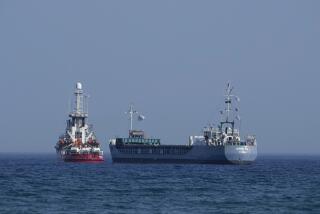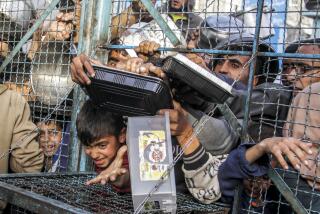Gazans keep crossing amid hints of end
Egyptian police stepped up their presence along the breached border of the Gaza Strip on Thursday, amid indications that the government would soon close it. But Palestinians by the tens of thousands continued to flow across in a mass, joyous shopping binge given urgency by months of isolation.
With estimates of the cross-border surge ranging from just over 100,000 people to as many as 500,000 -- one-third of Gaza’s population -- the border break presented Egyptian President Hosni Mubarak with a short-term opportunity to be seen as a benefactor of the Palestinians. But over the longer term, the situation was rife with challenge for Mubarak, who is trying to suppress Islamic militants in his own country who could be emboldened by the Gaza spillover.
Despite criticism from Israeli and U.S. officials, Egypt had yet to begin resealing the border, but the presence of baton-wielding police officers was greater than the previous day and security forces moved to ensure that Palestinians did not wander beyond coastal El Arish, about 25 miles southwest of Rafah. Egyptian officials intimated that the border would not remain open much longer, and analysts suggested that Egypt might move to secure it within several days.
The Bush administration was moving to end the miles-long processions of trucks, taxis and donkey carts streaming beyond the toppled Rafah wall. Undersecretary of State R. Nicholas Burns told reporters that Washington was in contact with Cairo and was prepared to assist Egypt in bringing stability to the Sinai.
“Our view is that order should be restored to the border,” Burns told reporters in Jerusalem, adding that services should be quickly restored to Gaza, which has been without fuel and other supplies because of an Israeli blockade.
In Washington, a State Department official said the administration was urging Cairo to act, and had spoken to Egyptian officials, including Mubarak.
“There are already indications that the Egyptians are moving to control” the crossing, the official said, speaking on condition of anonymity.
Mubarak, speaking in Cairo, said Egypt would keep “supporting the Palestinians and we won’t let them starve in Gaza.”
“We exert the maximum effort to end the suffering of the Palestinians and to put an end to the collective punishment of the Palestinian people,” he said.
The border region had the aura of a ragged frontier town of opportunists, money-changers, crooks and desperate families trying to haul back as much as could be carried in their arms and on their backs. Egyptian merchants were taking payment in dollars or Israeli shekels, as well as Egyptian pounds. Currency dealers on the Egyptian side of Rafah sold pounds at rates as high as 4.7 pounds to the dollar, about 20% higher than the going rate.
Palestinians who hustled across the border with plastic containers in search of fuel said filling stations on this side were running out of gasoline but that diesel was still available.
Abed Keshta, 50, who was driving a donkey cart, said, “Thanks to God and many thanks to Mubarak, who gave us this chance to do some shopping. I am going to buy whatever I can carry -- cement, milk, food, fuel, anything. I don’t think the border will be open forever. I want to store as much as we can before they close it.”
Among the purchases were cows, camels, sheep, goats and horses, which were led through the passage into Gaza. Palestinian merchants, seizing the opportunity, stocked up on wholesale quantities of cement and clothing. One Rafah trader hired a team of laborers to carry 625 88-pound bags of cement by hand into Gaza. Israel had stopped the importing of cement into Gaza, alleging that Hamas, the radical Islamist group that controls the coastal territory, would use the material to build tunnels and for other military purposes.
The Israeli deputy defense minister heightened tensions around the crisis by reiterating the commonly expressed sentiment that Israel could relinquish all responsibility for Gaza. Israeli Defense Minister Ehud Barak distanced himself from the remarks, according to the Associated Press.
Citing the possibility of extremist attacks on its citizens, Israel raised its alert level along the Egyptian border.
Some writers in the Middle East news media portrayed the crisis as a testament to the failed policies of Arab regimes and said that the tide of humanity spilling out of Gaza had forced Mubarak to act.
Mubarak’s decision to let Palestinians enter Egypt “is not just an attempt to allow the Palestinian and Arab streets to let off steam,” wrote Mohammad Aburumman in Jordan’s Al Ghad newspaper. “More than this, it represents a clear indication that the Arab regimes cannot stand still in the face of sweeping popular tension and anger, given that all their narratives and positions have starkly collapsed in the recent period.”
The chaos in Gaza offered a diversion from Mubarak’s domestic economic troubles, but the Palestinians also presented difficult quandaries: how long this poor nation can cope with a humanitarian crisis; the complicated and increasingly brusque diplomatic skirmishing with Israel over long-term border security; and the possible influx of militants who could add a dangerous element to Egypt’s main political opposition group, the outlawed Muslim Brotherhood.
The Egyptian government’s unease over Islamists exploiting the Gaza crisis was dramatized Wednesday when security forces in Cairo arrested scores of protesters and dispersed 2,000 demonstrators organized by the Muslim Brotherhood and other opposition groups. Egypt worries that Hamas will coordinate strategies with the brotherhood to incite unrest against Israel and undermine secular Middle East regimes.
The Egyptian economy relies heavily on tourism, which suffered downturns in recent years after terrorist attacks, such as in 2004 when 34 people were killed in three nearly simultaneous bombings at resorts on the Sinai peninsula. Analysts predict that Mubarak, as he did in 2005 when thousands crossed into Egypt from Gaza, will allow Palestinians a bit longer to buy supplies and then order his police to ease them back to Gaza and restore the barriers at Rafah.
The question remains, however, whether Mubarak can provide security that keeps Islamic radicals out of Egypt while halting the flow of weapons to Hamas, long a complaint of the U.S. and Israel.
“Nobody can accept the penetration of our borders,” Ibrahim Eissa, one of Mubarak’s most outspoken critics, wrote in his daily Al Dustour. “What our Palestinian brothers did when they destroyed and broke through the border wall is a dangerous and sad matter, although the motives are well understood and probably can be emotionally justifiable . . . but if a brother dares cross your borders, the enemy might dare do the same.”
Egyptians are historically sympathetic to the Palestinians “so the crisis boosts Mubarak’s image, but on the other hand problems can arise,” said Gamal Abdel Gawad, a political analyst with the Al Ahram Center for Political and Strategic Studies in Cairo. “There could be militants, terrorists, smugglers and traders coming across. There is no security at the border and all kinds of people are flowing freely.”
American officials raised similar concerns.
“Hamas is trying to take advantage of this incident to use it not only to let individual Gazans try and purchase consumer goods on the other side of the border but potentially to smuggle in arms and other materials to support their fighters,” Tom Casey, a State Department spokesman, said in a briefing in Washington. “And that is something that we and the Egyptians are concerned about.”
Americans have long-standing concerns about the Egyptian border with Gaza. Last year, experts from the U.S. Army Corps of Engineers traveled to Egypt to examine the border area for underground tunnels believed to be used by militants to smuggle in arms.
At the same time, U.S. officials are wary of the tightened Israeli blockade of Gaza, with shortages reported of consumer goods and medical supplies. “We continue to be concerned about the humanitarian situation,” Casey said.
There were reports that at least 40 Hamas policemen worked with Egyptian authorities to keep order along the border. One of them, Zaki Jamal, said, “Our duty is to secure the border and check the people coming back into Gaza. . . . Yesterday we arrested three people while they were trying to smuggle hashish into Gaza.
“We coordinate everything with the Egyptian security forces. We don’t know how long the border will stay open. But I think we have the capability to control the border if we must.”
--
Special correspondent Abu Alouf reported from Rafah and Times staff writer Fleishman from Cairo. Times staff writers Richard Boudreaux in Jerusalem and Paul Richter in Washington, and Noha El-Hennawy of The Times’ Cairo Bureau, contributed to this report.
More to Read
Start your day right
Sign up for Essential California for news, features and recommendations from the L.A. Times and beyond in your inbox six days a week.
You may occasionally receive promotional content from the Los Angeles Times.







